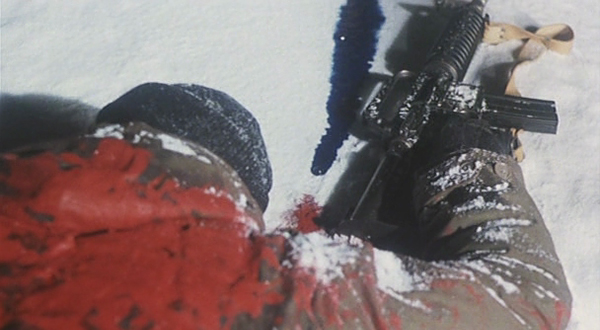Time to investigate yet another entry in Japan Society’s Beyond Godzilla: Alternative Futures & Fantasies in Japanese Cinema. Again we have yet another sci fi flick that defies what many Western audiences have come to expect from the genre, from that part of the world, given its strong associate with kaiju. And Blue Christmas is as far removed from Godzilla as one can get, though there is one truth that unites both movies, which is how the greatest monster is mankind…

Blue Christmas is a fairly obscure flick from director Kihachi Okamoto, best known for Sword of Doom. Though its name has regularly surfaced over the years, since I frequently search for new movies to watch every holiday season and am also fluent with hardcore Neon Genesis Evangelion trivia. In the case of the later, its where creator Hideaki Anno coined the term Blood Type Blue, which is regularly cited in Eva, plus he also used a photo of Okamoto as the face of an important off screen character in Shin Godzilla. Anyhow, Blue Christmas introduces a concept that is simple yet unique, and more importantly, supremely intriguing: whenever anyone comes in contact with a UFO, that person’s blood turns blue. And… that’s it. There are no other changes to the person. Actually, one individual claims that all of her petty jealousies, grudges, and other less than noble characteristics that many of allow ourselves to succumb to were all vanquished when her blood turned blue, but that could simply be an instance of self-realization that happens whenever a truly momentous occasion occurs (and encountering intelligence from another world seems like an appropriately eye opening event).
Once again, people are seemingly completely normal despite this change, and even though a possible scientific reason is given as to why people’s blood turns blue is tossed back and forth (which has something to do with the orange light that said UFOs omit), it’s still all a mystery, which inevitably transforms into fear and hostility towards anyone with blue blood. This ugly side of humanity, which has been consistent throughout history (and not to state the obvious, but which is alive and well), is what drives Blue Christmas’s narrative. A film that doesn’t have one lead but two; first there’s Minami, a reporter for the Japanese Broadcasting Corporation, who learns of a cover up by various governments, concerning the existence of people with blue blood, primarily the reasons behind the color change. Skeptical at first, he eventually becomes convinced that there is indeed a conspiracy going on; Dr. Hyodo was a prominent scientist who was laughed out of a conference for daring to bring up the existence of UFOs and also people with blue blood, who mysteriously disappeared afterward. Minami’s hunt eventually takes him to the USA, NYC to be exact. I haven’t mentioned thus far that Blue Christmas was filmed in the late 70s, so not only do we get to see Japan circa that point in time, but are treated to Old New York as well, which I’m super fond of. I also can’t help to point out the ridiculous hair of actor Tatsuya Nakadai, who plays the role of Minami; let’s just say the wacky wigs seen in SCTV was more based on fact than fiction.
Though there’s a reason why Minami’s quest for the truth is super personal: early into the film, a buddy of his at the network reveals that his gal pal, who just got the leading role of JBC’s big upcoming period drama, has blue blood. He asks Minami to keep it a secret, but it’s casually blabbed to an executive. Note: this is Minami’s first time hearing about the phenomena, and has no idea that they will eventually become targets of an insidious plan to have them eliminated from society. Well, word spreads and next thing you know, said actress finds herself at the hotel party of some American rock band called The Humanoids, who are in Japan on tour. They’re one of the first individuals on Japanese media to bring up the rise of UFO sightings, and spoilers, their over the top/cartoonish antics is not indicative of aliens in disguise as I had been hoping, but are just really bad actors (basically, if you’re a gaijin in Japan, you are guaranteed acting work, despite any lack of acting chops). Anyhow, as rock stars who are supposed to resemble the Beatles towards the end of their careers or the Rolling Stones at their height, there’s plenty of drugs at their shindig. Which gets planted on the actress (who didn’t even want to be there in the first place), then there’s a police raid, so she’s arrested and subsequently fired from the show, which leads to her taking her own life (being caught with drugs was basically career suicide back in the day in Japan). Minami feels responsible for all this, and his quest for the truth uncovers a sinister scheme that mirrors what happened to Jews during World War II.
I also mentioned another lead character, and its Oki, who provides the perspective from “the other side”. Specifically, that of a Japanese soldier, a cog in the machine, who must eventually carry out his duty and seal the fates of the blue bloods, whose existence becomes increasingly public and demonized as the film progresses. And of course things are complicated by the revelation that his girlfriend is one of them. Speaking of, Blue Christmas as a whole is quite complex; there is a lot going on, and it can be difficult to keep track of. I suppose another trait found in certain Godzilla flicks, primarily the most recent one, that’s present here is how there is a LOT of talking, maybe too much for some. Of all the movies in the Beyond Godzilla series, this one may have the least amount of special effects. As the few other reviews that exist in English have already noted, Blue Christmas is a fascinating mix of pulpy tropes, including alien invasion, subliminal messages in music (I forgot to mention that The Humanoid’s hit sing is Blue Christmas, which is heard throughout the movie; not the Elvis version, mind you, but the CHAR version), and rise of fascism, all packaged in a rather matter of fact, coldly observant manner. There is a slight tinge of whimsy at first, or so I thought, due to the sights and sounds of 70s, which slowly become muted as the heaviness of the plot takes root. While not immediately nihilistic as Sword of Doom, it’s there nonetheless, and simply creeps up on your. Stylistically, Eva nerds love to cite Blue Christmas as being a major influence on Anno, in particular his approach towards editing, though I also get the feeling that Takashi Miike was a fan, and even Jonathan Demme as odd as it sounds? Okamoto loves the looking into the camera close up shot, as does Demme, which in turn has influenced Wes Anderson and P.T. Anderson.
So yeah, I ultimately recommend Blue Christmas, though everyone should know exactly what they’re getting into. If you’re craving some cerebral sci-fi that touches upon some of the ugliness that continues to plague society to this very day, and won’t mind a slow pace and dense plot, which are thankfully has a dash of super cool 70s Japanese aesthetics, and a stroll through the streets of NYC circa that time as well (plus an extremely brief yet hilarious stop in Texas), then you can check it out at the Japan Society tomorrow at 4:00pm.
